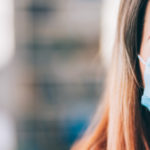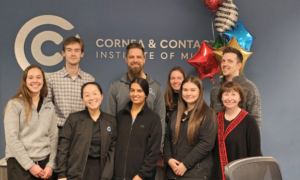By Cheryl G. Murphy, OD

August 12, 2020
As eyecare professionals gradually return to fuller schedules, it would be a gross understatement to say our work has changed. Handshakes have been eliminated, sanitization of all surfaces patients encounter is a must and personal protective equipment is worn by doctors and patients continuously. Since returning, I can tell you what I’m sure you already know: Many of these changes are necessary, but not easy.
Recently, I read a powerful article written by Jeffrey M. Liebmann, MD, an ophthalmologist and well-known glaucoma specialist from Columbia University, who I had the pleasure of hearing lecture at Vision Expo East one year. His article moved me and got me thinking about the future of optometry and ophthalmology and what it will look like.
New routines have us debating whether or not they will be implemented permanently. Old ways of doing things that were once well-respected have fallen to the wayside. For example, will visual field perimetry become a thing of the past? As Dr. Liebmann points out, there is no good way to clean the inside of a perimetry machine and it has been said that doing so may even damage the machine. Will this help further push and solidify the fact that OCT may be better for detecting early glaucomatous changes and it should be considered the new standard of care for monitoring early glaucoma? Will someone invent an open-air visual field perimeter? (Please??)
Other Articles to Explore
Another example: I recently had a patient with iris atrophy and a family history of glaucoma. Her pressures were fine. No pigmentation on corneal endothelium. Still, normally I would have considered doing gonio… but should gonio be done during COVID? Additionally, should multi-use bottles like those containing our dilating drops be replaced with single-use vials in order to eliminate the possibility of contamination among patients? The packaging and delivery of healthcare literally and figuratively is changing…but many of these changes may be for the better.
Here are three things I’ve found to be helpful as we go through these changes at work:
Adapt. We have to adapt to the new rules, schedule changes and procedures. They may or may not be temporary, but we should give them a chance as long as the changes are ethically sound, fair to both practice owners and employees and as long as they align with the protection of the health and well being of our patients and co-workers.
Breathe. Stop and breathe. Not just because we are wearing masks for possibly as long as 10 hours per day, but because we need to remind ourselves that most likely some of these changes (like masks) will not be with us for the rest of our careers. I have found it helpful to pause and remind myself that things are certainly different now, but they are not impossible. We need to stay the course and just do the best we can. We will have a sense of normalcy again, but it may take a while for the whole country to get there. In the meantime, allow yourself to take a deep breath. You are getting through this as we speak.
Continue to Care. Lastly, we need to care. This word is near and dear to our hearts as health-care providers and it has multiple meanings. Your patients need your kindness and support now more than ever. It can be difficult sometimes for us to express ourselves through a mask. Our smiles are hidden as is our sympathy. I recently had a patient talk about her mother’s passing. Normally I would have liked to touch the patient’s hand or shoulder, or maybe I would have given her a hug.
But COVID prevents me from doing those things and makes me wary of the amount of time I am spending in close proximity to each patient. Still, I gave the patient a minute or two of my time, lent her my listening ears and attentive eyes. It is possible to show you care from behind a mask. We still need to connect with our patients as best as we can during these trying times. It’s not only important for them, it’s important for us.
How have you adapted to returning to work? What testing or instrumentation do you feel may be eliminated or modified post-COVID? What methods have you used to connect with patients during this difficult time? How long do you feel COVID changes will last? Is the way we practice forever changed?
 Cheryl G. Murphy, OD, practices in Lake Ronkonkoma and Patchogue, N.Y. You can like her on Facebook or follow her on Twitter @murphyod. To contact her: murphyc2020@gmail.com.
Cheryl G. Murphy, OD, practices in Lake Ronkonkoma and Patchogue, N.Y. You can like her on Facebook or follow her on Twitter @murphyod. To contact her: murphyc2020@gmail.com.



























